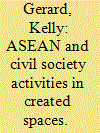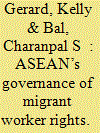| Srl | Item |
| 1 |
ID:
131895


|
|
|
|
|
| Publication |
2014.
|
| Summary/Abstract |
The Association of Southeast Asian Nations (ASEAN) has recently made numerous commitments to engage civil society organizations (CSOs) in its governance practices. However, the opportunities created offer limited means for CSOs to contest policy as a result of strict controls over who can participate and the forms of participation permitted. Activists have consequently pursued their agendas outside of spaces sanctioned by ASEAN through 'created spaces,' such as conferences organized parallel to official summits. However, this form of political participation has limited potential to influence official processes because despite its independence, these activities are still structured in relation to ASEAN practices. The ineffectual nature of CSO advocacy despite ASEAN's people-orientated shift has been documented, however explanations for this trend remain limited. This article applies the modes of political participation framework that acknowledges the role of intergovernmental organizations in structuring spaces for civil society participation and, in doing so, shaping the contribution that CSOs can make. Through an examination of the regulations and practices that govern CSO participation in both ASEAN-sanctioned and independent spaces, it argues that spaces for CSO participation are structured to prevent CSOs from contesting policy, suggesting that ASEAN's shift to widen participation is directed towards legitimating its reform agenda. Hence, ASEAN's claim of becoming 'people oriented' must be considered in recognition of the limiting effect its engagement practices have on CSOs' ability to advance alternative agendas.
|
|
|
|
|
|
|
|
|
|
|
|
|
|
|
|
| 2 |
ID:
157891


|
|
|
|
|
| Summary/Abstract |
Temporary migrant workers in Southeast Asia are subject to various abuses in recruitment, work and repatriation. A decade ago ASEAN governments committed to developing an Instrument governing migrant worker rights, but a series of deadlocks have stymied this agreement. Prevailing accounts explain this impasse as the consequence of incompatible national interests, norms of non-interference and consensus, a lack of institutional capacity and the limits of rights advocacy in ASEAN. Conversely, utilising a political economy framework, this article demonstrates this impasse in regional governance reflects societal-level conflicts among migrant workers, civil society organisations, business groups and state-based actors, generated by the latter’s adoption of migrant labour as both a livelihood and development strategy.
|
|
|
|
|
|
|
|
|
|
|
|
|
|
|
|